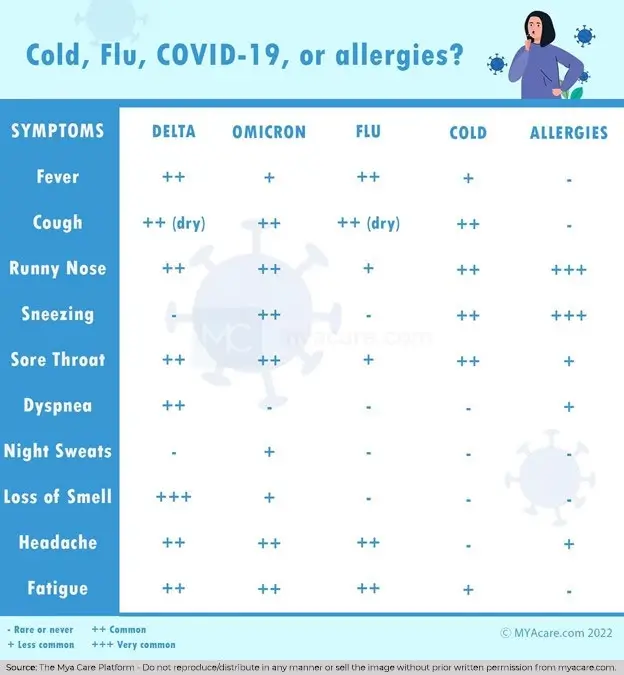COVID-19, Allergies, Common Cold and the Flu: How to Tell the Symptoms Apart

‘Tis the season again!... The flu season that is. The flu season is back this year, but with a kick. The COVID-19 pandemic is still going strong this winter, and with allergies, common cold, and The Flu coming into the scene, people are bound to confuse the symptoms of these very different conditions.
Sneezing, fever, muscle pain, and fatigue can all overlap, yet there are some distinct features that can help you know when you need to quarantine yourself or get tested for the novel coronavirus. With Delta, Omicron, and Florona (not a new variant; a co-infection of Flu and COVID) going around, things can get complicated.
The Flu (influenza) and COVID-19 can both cause fever, fatigue, and cough, which makes it very hard to tell apart. On the other hand, allergies and common cold are unlikely to produce these symptoms, and people who have them usually have a runny nose, sneezing, and face itching. We’ll try to break down the symptoms of each condition in this article to help you better understand the difference between these conditions, but first, here’s a detailed infographic comparing the symptoms of COVID-19, allergies, common cold, and the Flu:

COVID-19
The novel coronavirus pandemic has been going around for almost 2 years now, and it has been causing mayhem all around the globe. Since then, new strains have emerged. The most important were Delta, which became the dominant strain last summer, and Omicron, which is on it’s way to take the lead.
COVID-19, in all its variants, has been especially harmful in high-risk populations. This includes the elderly and those with heart or lung disease or diabetes.
During the ongoing pandemic, if you get any suspicious symptoms, you need to be tested. PCR tests and rapid corona tests are now part of our life.
It is important to know when you should suspect the coronavirus so that you distance yourself from the community and get tested.
The symptoms of COVID-19 usually include:
- Fever and/or chills
- Dry cough
- Fatigue
- Body aches
- Shortness of breath
- Headache
- Sore throat
- Loss of taste and/or smell
Over time, numerous mutations to SARS-CoV-2 have arisen leading to variations in the virus. Two, in particular, have become variants of concern: the Delta and Omicron variants. Keep in mind that the different variants will all cause COVID-19 and may show similar symptoms.
Delta variant
The COVID-19 Delta variant was discovered in late 2020 and has quickly spread, accounting for over 99% of the cases by the end of the year. Research has found that, as the virus evolved, Delta has become highly transmissible and twice as contagious as the first strain.
The symptoms of the Delta variant are more or less similar to previous variants or the original COVID-19. A few of the symptoms were more evident compared to others, namely:
- Dry cough
- Runny nose
- Sore throat
- Headache
- Fatigue
Loss of smell and/or taste, fever, and chills were prominent in earlier variants, but they were less reported in Delta cases.
Omicron variant
The first case of the Coronavirus Omicron variant was reported in late 2021. Today, Omicron has spread worldwide and is the primary variant of concern. Although it is highly contagious, evidence reveals that Omicron may cause less severe illness compared to Delta.
Health professionals have noticed that new patients are showing mild and different symptoms unlike before. Present data show that Omicron has brought about more flu-like symptoms and a less severe course. Reports of fever, cough, and loss of smell have since diminished.
The five common symptoms associated with the Omicron variant include:
- Runny nose
- Headache
- Fatigue
- Sneezing
- Sore throat
One of the more important features of Omicron is that it is more transmissible than Delta. This is because it multiples about 70 times faster in the human respiratory tract. Reinfections and breakthrough cases have been growing increasingly common, even in vaccinated individuals.
Although the mild symptoms can be a clue for Omicron, we still can’t be sure without testing. The flu-like symptoms of Omicron now also mean that people are less concerned, and regard it as just being a flu.
Regardless of strains and statistics, infection with any of the COVID variants can range from moderate to severe. If you suspect that you might have COVID-19, avoid physical contact with others, and call the responsible medical authority in your area to know what you need to do.
The Common Cold
The common cold can be caused by different viruses that lead to the same annoying symptoms. These are usually much less severe than the illness caused by influenza or coronavirus. The common cold can cause one or more of these symptoms:
- Runny nose
- Nasal congestion
- Sneezing
- Fatigue (Less likely)
- Body aches (Less likely)
- Mild cough
- Sore throat
- Headaches (Less likely)
As you can tell, a lot of symptoms of the common cold and COVID-19 overlap. However, compared to Delta, fever, cough, and fatigue are less pronounced with the common cold. Symptomatic treatment is usually enough to treat the common cold, and the symptoms should resolve in a few days on their own.
The Flu
The Flu is caused by the influenza virus, and it usually causes an illness that’s more severe than the common cold yet less severe than corona. Influenza can affect the nose, throat, and lungs, causing:
- Fever and/or chills
- Cough
- Fatigue
- Body aches
- Nasal congestion
- Runny nose
- Sore throat
- Diarrhea in children (sometimes)
A flu infection usually lasts 5 to 7 days. Hospital admission may be warranted in some cases, and you might receive antiviral medication. However, in most cases, the disease resolves on its own with supportive treatment alone. The symptoms of influenza resemble those of COVID-19, especially Omicron, and it’s likely that doctors will not be able to know which one you have without testing you.
The good news is, the Flu vaccine is widely available, and it’s highly recommended that you get it. It will help prevent infection and hence make it less likely that you will develop symptoms to be confused with corona.
Florona
Florona is the combined infection of the flu and COVID-19. It is not a new variant of the Coronavirus or a newly discovered disease. This double infection is caused by the presence of influenza and SARS-CoV-2 virus in your body simultaneously.
Co-infections are not a new occurrence. Unvaccinated people and those with poor immunity are more likely to become infected with Florona. The vulnerable population includes the elderly, pregnant, immunocompromised, and healthcare workers.
As a mix of respiratory diseases, Florona can spread when an infected person releases droplets containing the virus. Flu and Corona generally share similar symptoms:
- Runny nose
- Persistent cough
- Sore throat
- Headache
- Fatigue
- Shortness of breath
- Loss of smell or taste
- Loss of appetite
- Pain in the chest
- High temperature (above 38 °C)
Currently, there is not enough data on the severity of illness in patients infected with Florona compared to patients with only one virus. Although, cases of Florona may rise with the flu season and surge in Omicron.
Vaccinating yourself against both the flu and COVID-19 can significantly decrease your risk of getting infected and spreading Florona.
Allergies
Allergies can be either seasonal (usually in the spring) or go all year round, like if you’re allergic to dust. They can become especially annoying with their symptoms:
- Itching in your eyes and face
- Sneezing
- Runny nose
- Nasal congestion
- Watery eyes
- Fatigue (less likely)
- Headache (less likely)
Pollen, which fills the air in spring, is the classic cause of seasonal allergies. If you have allergic symptoms unrelated to changing seasons, you might be allergic to dust or another unidentified floater in the air. This tends to be a chronic problem that persists over weeks or months. Regardless of the allergen, your immune system reacts and causes the symptoms when you get exposed to it. Anti-allergic medications can be very efficient in treating your symptoms.
This year the stakes are high. With the COVID-19 pandemic, you need to stay on high alert. If you experience any of the symptoms above, you need to distance yourself from others and seek medical consultation. There’s no need to panic if you are coming down with a cough or fever since there’s a good chance it’s not corona. However, you will need to take extreme precautions until a medical professional confirms it. Precautions are of utmost importance this season. Wash your hands, avoid social gatherings, wear a mask, and stay safe!
If you’re not already vaccinated, take the first chance you get. The best COVID-19 vaccine is the one that is available to you the soonest.
To search for Healthcare Providers in India providing COVID-19 Vaccine, please click here.
To search for Healthcare Providers in Malaysia providing COVID-19 Vaccine, please click here.
To search for Healthcare Providers in Poland providing COVID-19 Vaccine, please click here.
To search for Healthcare Providers in Thailand providing COVID-19 Vaccine, please click here.
To search for Healthcare Providers in UAE providing COVID-19 Vaccine, please click here.
To search for the best healthcare providers worldwide, please use the Mya Care search engine.
Dr. Mersad is a medical doctor, author, and editor based in Germany. He has managed to publish several research papers early in his career. He is passionate about spreading medical knowledge. Thus, he spends a big portion of his time writing educational articles for everyone to learn.
Sources:
Featured Blogs



